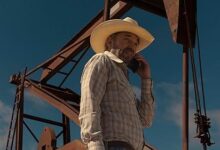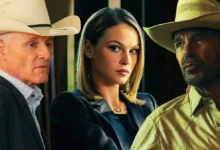‘1923’ Review: The Romanticized American West Continues To Be A Cruel & Hostile Place In Season 2
Creator/producer/writer/ Taylor Sheridan, the impresario behind the “Yellowstone” empire and the ever-expanding Sheridan-Verse on Paramount+, is a bit of a drama queen. I mean, who else names an episode something as melodramatic and outrageous as “The Rapist is Winter?” That’s Sheridan for you, though, always trying to be provocative. The prolific writer, known for a type of masculine poetry, is also continually trying to entertain and perpetually telling the same story over and over again. That narrative? Men are the products of their environment and land, and their use of violence, force or might to protect their land or environment, is just a response to the hostile environment around them, which is nine out of ten times, always merciless.
Whether it’s the corrupt world that revolves around the harsh prison industrial complex (“Mayor of Kingstown”), the Mexican cartel and various problems threatening lucrative oil fields (“Landman”), or competing Oklahoma gangs encroaching on territory (“Tulsa King”), the common throughline of all of Sheridan’s series, is essentially, protecting what’s yours no matter what the cost—a thoroughly American idea, especially by people who frequently forget what is “theirs,” especially in the Western era shows, were stolen. But might is right in America and thus also the word of God in all of Sheridan’s shows.
It’s a cynical but not incorrect assessment, considering the world we live in. Sometimes in the Sheridan-verse, what is being protected is somewhat less tangible—power, privilege, influence—but in the Western wing of Sheridan’s shows, the “Yellowstone”-verse, it’s all very literal. It’s people protecting their fiefdom and land alongside the elements of the cruel, unforgiving West, either manmade or natural. It’s what happens in “Yellowstone” in a modern context, and it’s what certainly occurs in Sheridan’s “Yellowstone” prequel series, “1923.”
READ MORE: The 75 Most Anticipated TV Shows Of 2025
If Kevin Costner’s John Dutton does everything he can to defend the Yellowstone ranch and his power in the surrounding Montana region, well, Harrison Ford’s Jacob Dutton, John’s grandfather is essentially doing exactly the same during the era of prohibition and the encroaching Great Depression, alongside his tough and dutiful wife Cara (Helen Mirren).
As familiar as it always is, credit Sheridan for telling the same story over and over again, thematically, and each of them still feels relatively unique and different thanks to their different environmental and historical context.
Season two of “1923” is not really all that much different from season one, but of course, the stakes are raised, and thus, the drama and melodrama escalate.
In season one, the Dutton family fended off the invasive Scottish sheepherders led by Banner Creighton, (Jerome Flynn from “Game Of Thrones”), but in season two, Banner now has a wealthy, powerful backer in the business tycoon Donald Whitfield (Timothy Dalton), who has a vested financial and imperial interest in seeing the Dutton family thwarted and the Yellowstone ranch razed to the ground.
Sexually sadistic with a BDSM threesome kink, as f*cked up as it is, Whitfield’s character is at least an entertaining narcissist and sociopath who hires prostitutes to sexualize and torture for pleasure. His gleeful evil is twisted, but at least is a bit deliciously perverse to watch.
Whitfield, meanwhile, is selling futures and the still-new and novel idea of escapism. Something of a business visionary, he sees the opportunity in ski resorts and winter getaways for the rich and privileged flush with spending money, but he needs Banner to resume his war with the Duttons and finish off their ranch.
Concurrently, as Banner builds up an army to take out the Yellowstone ranch, the cavalry—the skillful war hero Spencer Dutton (breakout actor Brandon Sklenar)— is coming home to help. Last seen in Africa in season one as a game hunter, he was separated from his English rose new wife Alexandra (Julia Schlaepfer) by the end of the inaugural series (incidentally, for those keeping score, Spencer is the now-adult youngest son of James and Margaret Dutton, Tim McGraw and Faith Hill’s character’s on “1883,” Ford’s character is McGraw’s older brother).
If A story is the Duttons vs. Banner and the Scottish thugs, B story is Spencer’s long and winding journey back to the Dutton’s Montana, and C story is Alexandra doing the same, but on her own and in much predatory peril. story D being that of Teonna Rainwater (Aminah Nieves), the rebellious young Native American (Crow) girl who fled the American Indian boarding school for girls after she violently murdered the brutally abusive nuns who tortured her in season one (R.I.P., Jennifer Ehle)
Being vengefully hunted after by French Roman Catholic priest Father Renaud (Sebastian Roché) and the clergyman’s own merciless lawman, Marshal Kent (Jamie McShane), Teonna links up with Hank Plenty Clouds (Michael Greyeyes) and his son, who try and get her to safety.
As many Sheridan narratives are wont to do, all roads lead back to Yellowstone it seems, each progressing further with plenty of danger, jeopardy, conflict and bloodshed along the way.
But the unmistakable thread through it all—again, not unlike his other shows, especially the “Yellowstone” ones is that the new world and this new still-forming America is a punishing and antagonistic place where only the strong survive.
Sheridan always romanticizes the American West, the hard-as-nails men who tamed it, the salt-of-the-earth women who made it tolerable with their wisdom, wit and love, the children who were either great disappointments or great devoted disciples of their father’s gumption and well, you get the idea. It’s very American and sums up the creator’s patriotic, rose-tinted view of America and those who conquered it for the rest of us.
The theme manifests everywhere, Elizabeth “Liz” Strafford (Michelle Randolph, also from “Landman”) trying to leave her husband Jack Dutton (Darren Mann), Jacob’s only son because she didn’t sign up for this: and by this, she means the grueling nature of the frigid Montana world around her.
Support independent movie journalism to keep it alive. Sign up for The Playlist Newsletter. All the content you want and, oh, right, it’s free.
Sheridan’s writing is masculine poetry, especially the dialogue, and it’s also melodramatic. he can’t resist adding the most obvious obstacle to an environment in any situation (an ocean? A shark nearby, the freezing winter? A wolf coming to eat you).
To that end, “1923” is more of the same meat and potatoes that Sheridan generally delivers, but thanks to Ford, Mirren and standouts like Sklenar, Schlaepfer, and Randolph, it’s generally compelling TV, not to mention ambitious in its scope. It doesn’t hurt that there’s no shortage of great character actors around every corner: Brian Geraghty, Robert Patrick, Marley Shelton, James Badge Dale, Bruce Davison, C. Thomas Howell, Jennifer Carpenter, etc. etc. Hey, at the very least enjoy it for the cinematography, production design, costumes, and budget that is probably the biggest on television right now. [B]




